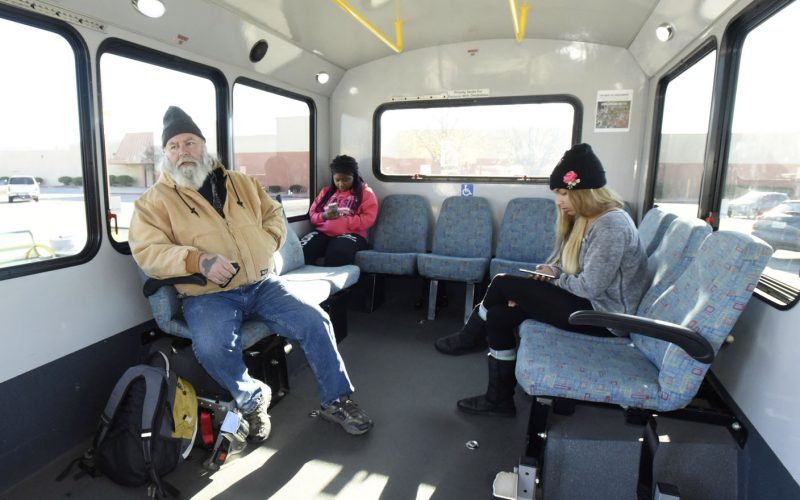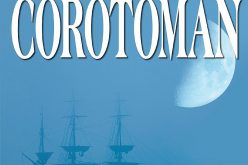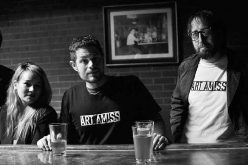
The Free Weekly/FLIP PUTTHOFF
Justin Cunningham (left) of Bentonville, a regular Ozark Regional Transit passenger, waits for a bus to depart from a stop in Rogers. Cunningham said the bus service is excellent.
Transportation needs must be addressed
DAN HOLTMEYER
dholtmeyer@nwadg.com
Northwest Arkansas’ public transportation system can’t be successful as it’s designed, a transit expert told area leaders this month.
The Northwest Arkansas Regional Planning Commission and Walton Family Foundation on Nov. 13 held the first of a series of talks on mobility in a growing region, with a particular focus on mass transit.
Jarrett Walker, an author and consultant from Oregon, told dozens of planners, transportation officials and others Ozark Regional Transit’s bus routes try to cover as much ground as possible with winding routes because that’s what cities and counties paying the organization demand.
Spreading out paradoxically means serving fewer people, however, because buses can’t come as often and don’t get to where most people want to go quickly, Walker said. That can prompt local governments to look at the transit system’s relatively low ridership, roughly 1,000 a day, and decide it’s not worth paying more to improve it. Walker compared the situation to a taxi driver being told to turn both directions at once and getting yelled at for failing.
Walker called good transit a win for entire regions, even for residents who don’t use it, not just because of its lower use of gasoline than cars or its lower costs for low-income people, but also because of the simple concept of space. Roads and highways have only so much space. Northwest Arkansas, one of the country’s fastest growing metropolitan areas, is quickly filling it.
“There is no keeping things the way they are,” Walker said, and no good reason to wait for traffic congestion to become a truly major problem. Los Angeles did so and now is trying to fix its well-known traffic jams at “catastrophic expense,” he said.
Joel Gardner, Ozark Regional Transit’s director, said he was just glad someone else was saying what he believes.
“I will sing that from the rooftops, and everyone will say, ‘Oh, look, it’s the transit guy’,” he said after Walker’s talk. “We know what we are right now — we’re a placeholder for the future.”
He went on, “We are nowhere near as efficient as we should be, as we could be. Right now, we are given limited funding to do the maximum amount of service to the community that we possibly can.”

The Free Weekly/FLIP PUTTHOFF
Carlos Rendon, who has driven an Ozark Regional Transit bus for 10 years, shows the computer that delivers his route schedule. Rendon waited for passengers to board his bus at Frisco Station Mall in Rogers.
The picture now
Ozark Regional Transit runs about a dozen routes in Benton and Washington counties with adult fares of $1.25. Most run through Fayetteville or Springdale. Buses generally pass a given stop once an hour on weekdays. The system offers pickup service for people with disabilities and others off-route. An annual operating budget of about $3 million to cover it all comes mostly from fees, local government support and federal grants.
Walker pointed to several essential ingredients for an efficient and well-used transit system that gives people the freedom to reach more of their community: High frequency; a network connected to popular destinations and walkable areas; and reasonable speed and reliability once someone’s on a bus. They need a certain density along their routes, he added; not only are there more potential riders in dense areas, but people in those areas are actually more likely to use transit than others.
The routes have to be numerous enough that housing alongside them doesn’t become too expensive for people of all incomes to reach jobs and school and recreation, Walker noted.
A good system with all of these characteristics will still leave out a lot of less-dense or far-flung areas, Walker said. That’s not a bad thing.
“This is not like libraries and fire stations,” he said, urging the region’s leaders to make a decision on where they want to fall in the continuum between covering a lot of area on one end and providing quick and efficient service on the other. “That’s what elected officials are for.”
Washington County gives a good example of the debates and trade-offs. The Quorum Court this month decided to cut $100,000 of its support for Ozark Regional Transit, leaving a little more than $20,000. The money went to a rural route that reached some smaller cities.
Some court members pointed out the value of transit for attracting employers and giving low-income people access to jobs in the bigger cities, while others said transit helps cities and should be supported by them, not the county.
“There are places where they should be and places where they shouldn’t be,” Republican Bill Ussery of Springdale said of transit routes during a budget committee meeting a week ago, echoing some of Walker’s points.
Regional ideas
Don Marr, chief of staff for the Fayetteville mayor, was one of several Fayetteville officials attending Walker’s talk. He took heart at Walker’s advice to start a bigger transit system where it’s wanted — Fayetteville’s university students and other residents want it, Marr said. The city pays $550,000 a year to Ozark Regional and to the University of Arkansas’ bus system.
“We have to get serious in the discussion with our citizens. We can’t just keep building roads,” Marr said. “If we really want the system that people feel like meets the need, that goes to the high density places, that has the frequency and the days of service that we want, it’s going to take a bigger investment.”
Bentonville Mayor Bob McCaslin said he isn’t convinced there’s enough density and demand to justify more money for transit. The city pays about $125,000 to Ozark Regional for one route that includes stops at Northwest Arkansas Community College and Northwest Health’s Bentonville hospital.
“I do not hear any overwhelming, you might say, shouts of more, more, more,” he said. “We do recognize it’s important to a very small percentage of our citizenry.”
The mobility talk series is meant to bring together perspectives like these and see if they can meet, said Tim Conklin, assistant director for the regional planning commission. The commission back in 2010 released a lofty transit development plan that envisioned millions of dollars more pumping into the system that could multiply the number of buses several times.
“None of those expansions have happened, but there’s still a desire within the region to look at how to improve transit,” Conklin said, adding the commission is working on updating that development plan. “It needs to be everyone’s plan.”
The series will include three more talks in the next several months, Conklin said, with the dates to be determined.
A Walton Family Foundation survey of Northwest Arkansas’s quality of life found about one-third of respondents wanted a mass transit system, and the foundation has sent groups to Seattle and Denmark to learn how those places run transit systems and integrate them with other kinds of transportation.
Buses and trains in Denmark accommodate bicycles, for instance, said Karen Minkel, home region program director for the foundation. Here, that integration might manifest itself as a bus route that runs parallel to the Razorback Greenway.
The foundation sees transportation, the ability of all people to get to jobs and services, as a critical issue for the region to stay on top of, Minkel said. It’s also paying for an Ozark Regional feasibility study looking into how the group might expand its offerings.
“Transportation only becomes more expensive to address the longer you wait,” Minkel said.






